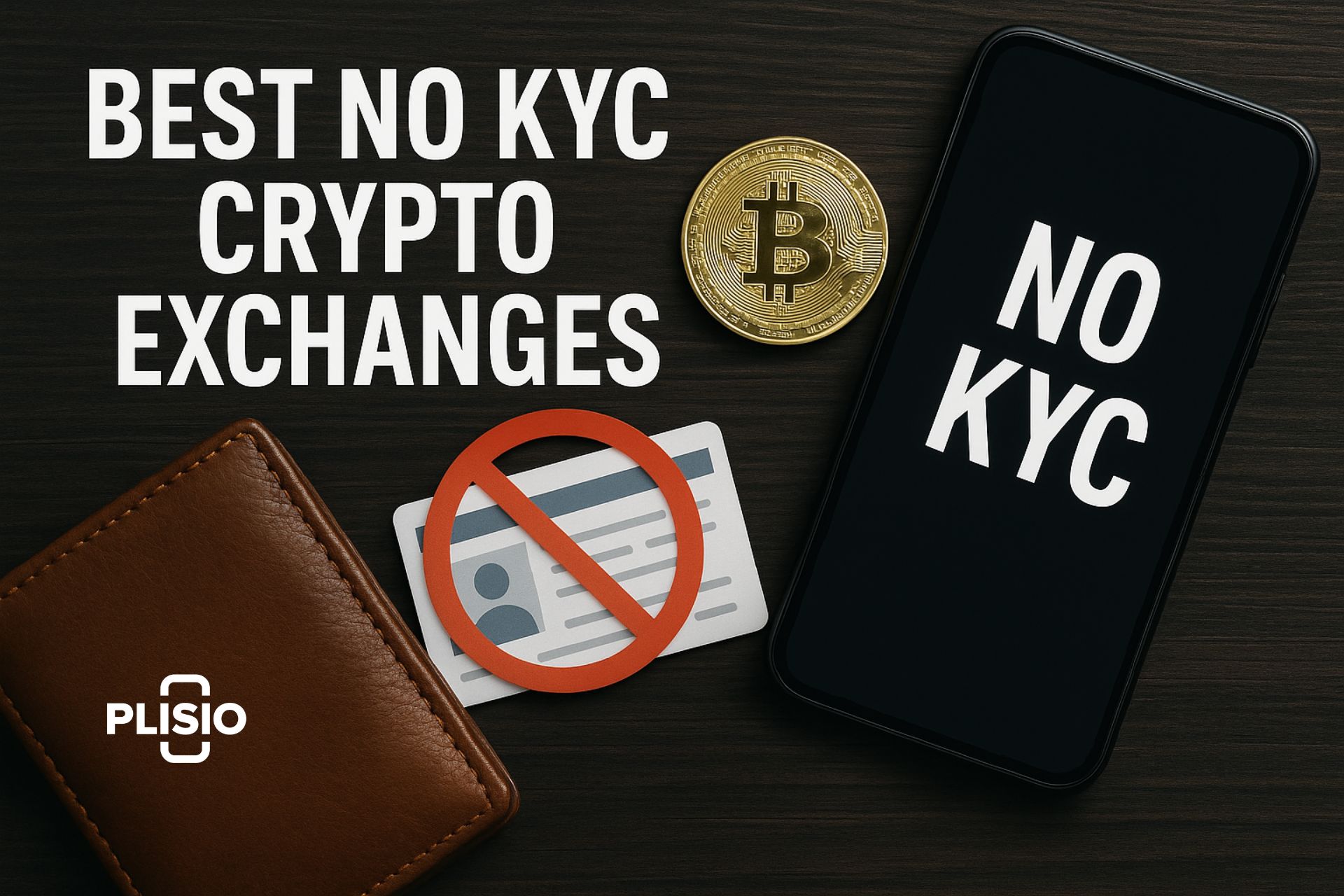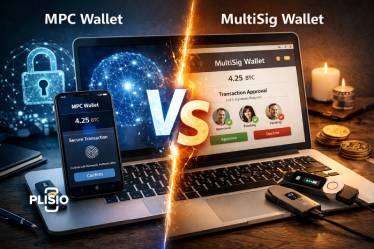Best No KYC Crypto Exchanges

Looking for a way to engage in cryptocurrency transactions without the need to provide personal identification? Amidst increasing scrutiny from government agencies worldwide, there remains a niche in the crypto ecosystem for exchanges that operate without requiring Know Your Customer (KYC) information.
Privacy-conscious individuals in the crypto markets often gravitate towards these no KYC cryptocurrency exchanges. These platforms stand apart from traditional financial services, allowing users to trade and invest in digital assets without undergoing extensive identity checks. They support a variety of payment methods, including cryptocurrencies, bank transfers, credit cards, and even prepaid cards, broadening access to the world of digital asset trading.
However, for the majority, KYC has become an inescapable aspect of dealing with cryptocurrencies. Most major crypto exchanges require users to complete KYC procedures before permitting any significant transactions. While the primary goal of KYC is to monitor and prevent illicit activities, it often involves sharing personal information, which can be a point of concern for many users.
KYC: Why Would Anyone Want to Avoid It?
The choice to bypass Know Your Customer (KYC) processes in the financial world, particularly in cryptocurrencies, can be driven by various factors:
Preserving Privacy
- The discomfort with sharing personal details is a significant concern.
- Worries about the usage and accessibility of personal data are prevalent.
Maintaining Anonymity
- A preference for anonymous financial dealings is common.
- KYC demands revealing identity, which conflicts with the desire for anonymity.
Reducing Time and Effort
- The KYC procedure is often lengthy and laborious.
- Many are reluctant to dedicate the necessary time and effort.
Security Worries
- Sharing information with third parties raises the risk of identity theft and fraud.
- Concerns about data breaches or theft during the KYC process are valid.
Accessibility Challenges
- Restrictions such as geographic location or lack of necessary documentation can hinder KYC completion.
- These barriers can limit access to certain financial services or cryptocurrencies.
Having explored the reasons behind the reluctance to adhere to KYC requirements, it becomes clear why there is a market for crypto exchanges that don't require KYC. Next, we'll examine some of the top crypto exchanges operating without KYC mandates.
What are the best no KYC crypto exchanges?
We’ve analyzed the markets for the best no KYC crypto exchanges – here’s a list of the best providers:
HODL HODL
Hodl Hodl is carving out a niche in the cryptocurrency exchange world as a non-custodial, peer-to-peer (P2P) Bitcoin trading platform. This innovative platform empowers users to trade directly with one another, bypassing the need for the exchange to hold user funds. Instead, Hodl Hodl utilizes a multi-signature escrow system, which secures Bitcoin transactions and reduces the risk of theft, offering an enhanced layer of security.
A standout feature of Hodl Hodl is its approach to user privacy and autonomy. Unlike most centralized crypto exchanges, Hodl Hodl is not bound by complex compliance procedures. As a result, there is no mandatory Know Your Customer (KYC) policy on the platform, allowing users to retain their anonymity and personal information. This feature positions Hodl Hodl as a preferred choice for those who prioritize privacy in their Bitcoin trading activities.
Further enhancing its appeal, Hodl Hodl offers diverse payment options for its peer-to-peer transactions. Users can choose from a range of methods including bank transfers and in-person payments, providing flexibility and convenience in trading. Despite its focus on privacy and security, Hodl Hodl does have some limitations, notably being restricted to Bitcoin trading only.
In summary, Hodl Hodl's unique offering of secure escrow-based P2P Bitcoin trading, combined with its no-KYC policy and varied payment options, makes it an attractive and distinct choice in the realm of cryptocurrency exchanges.
dYdX
Founded in 2017 by Antonio Juliano, dYdX has established itself as a prominent player in the world of decentralized exchanges. It is renowned for being the largest decentralized exchange in terms of trading volume, particularly for its focus on leveraged trading options across a wide range of cryptocurrencies.
dYdX operates as a hybrid decentralized exchange, offering perpetual trading options for over 35 cryptocurrencies. This platform caters to the more experienced trader, especially those with a solid understanding of leverage and risk management. Users can trade popular cryptocurrencies like Bitcoin, Ethereum, Cardano, and many others, with leverage up to 20x. This leverage enables a substantial amplification of trading capital; for instance, a $100 stake in Bitcoin can be increased to $2,000 in trading power.
One of the unique aspects of dYdX is its non-custodial nature. The platform does not hold user funds, instead of utilizing multi-signature escrow to secure transactions. This approach, coupled with the absence of Know Your Customer (KYC) requirements, allows users to trade with a high degree of privacy and security. All that's needed to start trading on dYdX is to connect a non-custodial wallet, with support for various options like MetaMask, Trust Wallet.
dYdX stands out for its competitive fee structure, which scales down with increased trading volumes. The exchange offers low trading fees, starting at 0.05% per slide, with additional discounts for higher volume traders and those providing liquidity. Moreover, the platform is equipped with advanced trading tools, including detailed pricing charts and a comprehensive suite of technical indicators, catering to the needs of sophisticated traders.
However, it's important to note that dYdX is not suitable for beginners in the crypto trading space due to its complexity and the focus on leveraged trading. Additionally, the platform does not support fiat money payments and is not available to residents in certain countries, including the US and Canada.
In summary, dYdX emerges as a top choice for experienced traders seeking a no KYC, high-volume trading platform with leverage options, although it may present challenges for those new to cryptocurrency trading.
BYBIT
Bybit, established in 2018 and based in Singapore, has rapidly emerged as a major player in the cryptocurrency exchange landscape. It ranks among the top five exchanges globally in terms of daily trading volume, boasting over $700 million. The platform caters to a wide array of trading preferences, offering more than 400 cryptocurrencies for trading, and supports all major fiat currencies including USD, EUR, GBP, AUD, and CAD.
The exchange is particularly renowned for its diverse investment opportunities. These include spot trading, margin trading, leveraged tokens, and derivatives trading in the form of contracts and options. Additionally, Bybit provides various products for earning passive income from cryptocurrencies, such as savings accounts, liquidity mining, and ETH 2.0 staking.
One of the key attractions of Bybit is its user-friendly interface, making it ideal for traders who are keen on margin trading. It offers four primary perpetual swaps: BTC, EOS, XRP, and ETH. The platform is also known for its generous welcome trading rewards program, offering new members up to $90 to begin trading.
Regarding KYC policies, Bybit has a tiered approach. While it allows for Non-KYC trading, there are certain restrictions. Users who haven't completed any KYC can't access earn products and face a daily withdrawal limit of 20,000 USDT. Notably, the exchange may require KYC for approving withdrawal requests at any point. For accounts without KYC, the withdrawal limit is set at 2 BTC.
However, Bybit faces certain geographic limitations. It does not serve residents of the U.S. and the UK, and users must confirm they are not from these restricted countries to use the site. The use of VPNs to circumvent these restrictions is against Bybit's terms and conditions and can lead to account suspension.
In summary, Bybit stands out for its high trading volume, a wide range of cryptocurrencies, and varied trading options. While it offers some flexibility with KYC requirements, there are certain limitations and geographical restrictions that users need to be aware of.
CHANGELLY
Founded in 2015 and headquartered in the Czech Republic, Changelly has emerged as a leading cryptocurrency exchange known for its flexibility and user-friendly approach. The platform offers an easy entry point for beginners, requiring just an email address to start trading, making it highly accessible for those new to the crypto world.
Changelly stands out for its extensive range of services and features. It supports the trading, buying, and swapping of over 500 crypto assets, appealing to a diverse range of traders from novices to seasoned experts. Initially offering direct crypto purchases with credit cards, Changelly has expanded its services to include selling crypto and DeFi swaps on BNB Smart Chain, Ethereum blockchain, and its layer 2s.
For users looking to buy crypto with fiat, Changelly provides multiple options like MoonPay, Simplex, or Wert, as well as Apple Pay or PIX. Its multi-chain token exchange capability allows users to swap various currencies, such as exchanging Bitcoin for Ethereum or Solana. The platform also offers advanced features like DeFi exchange and the ability to sell crypto for fiat currency. However, to utilize the crypto offramp feature and sell crypto for fiat, users must complete KYC with Mercuryo, though not with Changelly itself.
Changelly's user-friendly design is exemplified by its straightforward three-step trading process: selecting a crypto pair, entering a wallet address, and completing the payment. This simplicity, combined with partnerships with industry heavyweights like Binance and secure wallet providers like Trezor, bolsters the platform's reliability and appeal. Additionally, the platform's app provides competitive rates and special discounts for initial exchanges, further enhancing the user experience.
While basic trading on Changelly requires only an email, accessing more advanced features like fiat-to-crypto trading involves providing additional information and completing KYC verification. Despite these requirements for some services, Changelly remains a preferred choice for those seeking a secure, identity-verification-free trading experience for basic transactions.
In summary, Changelly offers a comprehensive and convenient service for cryptocurrency enthusiasts. Its expansive cryptocurrency portfolio, variable fee structure, and support for ERC-20 token swaps on decentralized exchanges like Uniswap and Sushiswap, make it a competitive and trusted platform for private, hassle-free crypto transactions.
Are NO KYC Exchanges Safe and Legal?
The concept of no KYC (Know Your Customer) crypto exchanges operates within a complex and often unclear legal framework, with their safety and legality varying significantly by jurisdiction. Typically, these exchanges find themselves in a regulatory gray area, especially in regions where the laws are not well-defined or are evolving.
From a safety perspective, no KYC exchanges offer the advantage of less susceptibility to personal data breaches or unauthorized access, as they store minimal user information. This aspect could be seen as a safety benefit compared to KYC-compliant exchanges. However, the absence of regulation and oversight in these platforms also introduces risks such as potential involvement in money laundering or fraud. Users might face limited options for recourse in disputes or losses, given the exchanges' operation outside traditional financial systems.
Legally, many countries require cryptocurrency exchanges to implement KYC and AML (Anti-Money Laundering) procedures as a measure against financial crimes. Non-compliance can lead to legal actions, including fines or operational shutdowns. Regulatory bodies like the Securities and Exchange Commission (SEC) in the United States, and international organizations like the Financial Action Task Force (FATF), play significant roles in setting standards and regulating financial activities, including those on crypto exchanges.
For users preferring traditional payment methods for buying cryptocurrencies, such as debit/credit cards or e-wallets, undergoing a KYC process is inevitable due to anti-money laundering regulations. This is a standard practice across financial platforms, including online brokers and forex trading platforms. Major exchanges like Binance have tightened their policies, restricting trading for non-KYC users, and national regulators have clamped down on anonymous peer-to-peer trading, which previously allowed KYC-free exchanges.
According to FinCEN, peer-to-peer exchanges must comply with the Bank Secrecy Act, necessitating the maintenance of customer records, which is impossible without a KYC process. However, decentralized exchanges such as Uniswap, SushiSwap, and PancakeSwap operate differently, handling only crypto-asset trading and sometimes partnering with third parties for fiat transactions, which in turn manage their own KYC processes.
Benefits of Using a No KYC Crypto Exchange
Non-KYC crypto exchanges offer a unique set of benefits, chief among them being the ability to trade cryptocurrencies anonymously. These platforms do not require users to divulge personal information, a stark contrast to traditional crypto exchanges. Typically, regular exchanges ask for extensive details such as the trader’s name, nationality, home address, date of birth, and contact details.
Beyond just personal information, traditional KYC processes often extend to demanding verification documents. This can include identity proof like a passport or driver's license and address verification through recent bank statements or utility bills. None of these are necessary with non-KYC exchanges, where users can trade cryptocurrencies without any identity or document verification.
Another significant advantage is the elimination of account registration. Leading non-KYC crypto exchanges enable trading without the need to open an account. For instance, a platform like Plisio simply requires a connection to a private wallet for transactions. Here’s a typical scenario:
- A user accesses Plisio website.
- Transfers to Plisio wallet 1 ETH.
- The user decides to swap Ethereum for Tether and selects the ETH/USDT market on Plisio.
- Upon confirming the swap, Plisio smart contract processes the deduction of 1 ETH from the user’s wallet.
- Simultaneously, an equivalent amount of USDT is credited to the user’s wallet.
This process exemplifies the straightforward, private, and hassle-free trading experience provided by non-KYC crypto exchanges. They remove the need for accounts, personal data sharing, and document verification, making for a more seamless and private trading journey.
Will the government crack down on non-KYC exchanges?
The world of cryptocurrency exchanges, particularly those operating without KYC (Know Your Customer) procedures, is dynamic and subject to change. A notable example is Binance, which, after years of regulatory pressure, shifted its policy in 2021 to mandate KYC for all new users. This trend may continue as regulatory frameworks around the globe evolve and tighten.
In the United States, the landscape is further shaped by legislative developments. The cryptocurrency infrastructure bill, for instance, mandates all crypto brokers to submit 1099 tax reporting information to the IRS. This regulation is a significant move towards greater transparency and accountability in the industry.
Looking ahead, it’s anticipated that both centralized and decentralized exchanges will be required to implement KYC procedures to comply with Form 1099-DA regulations, set to be enforced in the 2025 tax year. This shift is part of a broader trend towards ensuring that cryptocurrency transactions are traceable and taxable, in line with traditional financial transactions.
Such changes are reflective of a growing recognition of cryptocurrencies within the formal financial system and a move towards standardizing regulations across different types of exchanges. Users of non-KYC exchanges should stay informed about these regulatory changes, as they could impact the way these platforms operate and the level of anonymity they can offer in the near future.
What are the different types of crypto exchanges?
In the world of cryptocurrency trading, exchanges can be broadly classified into two main types: Centralized Exchanges (CEXs) and Decentralized Exchanges (DEXs). This discussion will particularly focus on centralized exchanges that do not require KYC (Know Your Customer) procedures.
Centralized Exchanges, akin to traditional stock exchanges, are overseen by a single regulatory authority. This authority monitors all transactions and manages user accounts, ensuring a regulated trading environment. One of the key advantages of CEXs is their ability to offer high liquidity and faster transaction processing. However, they have a significant drawback: user data is stored on centralized servers, which poses a risk of hacking and potential manipulation of trading volumes.
On the other hand, Decentralized Exchanges operate on a blockchain or distributed ledger technology, eliminating the need for a central overseeing authority. In DEXs, users have full control over their digital assets and private keys, enhancing the security and privacy of their transactions. While DEXs generally offer greater privacy and often do not require KYC, they may face challenges like lower liquidity compared to their centralized counterparts.
In summary, while CEXs offer speed and liquidity, they bear risks associated with centralized data storage. DEXs, conversely, provide enhanced security and privacy at the cost of potentially lower liquidity, reflecting the trade-offs in the evolving landscape of cryptocurrency exchanges.
Which crypto payment gateway has no KYC?
Plisio is a cryptocurrency payment gateway that facilitates Bitcoin Cash (BCH) transactions and accepts Bitcoin (BTC) payments, leveraging a decentralized exchange framework. This system can be implemented in less than five minutes, allowing for seamless integration with your website's existing design.
Plisio offers extensive plugin support for platforms like WHMCS and WordPress, coupled with a payment API designed for custom configurations. Their suite of features is robust, including specialized tools such as BCH invoice generation and a wallet monitoring service. The advantages of using Plisio are considerable: they charge a low transaction fee of 0.5%, there are no restrictions on the amount of BTC that can be transacted, and they offer round-the-clock customer support.




